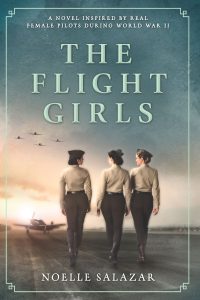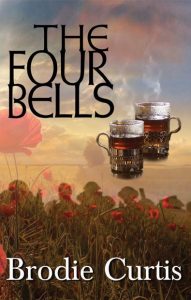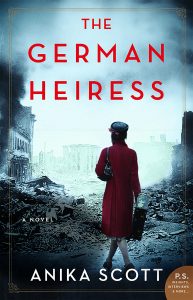New Voices: Brodie Curtis, Alka Joshi, Noelle Salazar & Anika Scott
WRITTEN BY MYFANWY COOK
Brodie Curtis, Alka Joshi, Noelle Salazar & Anika Scott combine imagination, rich historical detail, and fresh perspectives in their debut novels.
 Stories are both created and can inspire us, as Alka Joshi, author of The Henna Artist (MIRA, 2020), explains. “My father tells this story. It’s dinnertime in India. I’m five. My mother stops my grandmother from spooning more subji and chapatti onto my brothers’ plates than on mine. She says, ‘In my house, my daughter is equal to my sons.’
Stories are both created and can inspire us, as Alka Joshi, author of The Henna Artist (MIRA, 2020), explains. “My father tells this story. It’s dinnertime in India. I’m five. My mother stops my grandmother from spooning more subji and chapatti onto my brothers’ plates than on mine. She says, ‘In my house, my daughter is equal to my sons.’
Joshi adds: “Time and again, my mother made sure I would never take a back seat to the boys. She, who had an arranged marriage at 18 and three children by the age of 22, encouraged me to make choices she never had in life: whom to marry, when to marry, whether to have children, what to do for a living.” The consequence of her grandmother and mother’s encouragement was that Joshi “began to wonder: what would a creative woman like her have done if she’d had the freedom to choose her own direction in life? That wonder turned into a reimagining of her life in 1955, a novel titled The Henna Artist. My mother is Lakshmi, the young woman who defies convention and flees her marriage, reemerging as a henna artist in Jaipur during the heady years after India’s independence. Despite the obstacles she encounters and the cost to her family’s reputation, she clings to a life of her own making.”
Joshi’s mother lived with her for the last seven years of her life. They “traveled several times to India, exploring old haunts, visiting her old school, talking to henna artists, Ayurvedic experts, ex-army people, dancers and former royalty.”
From her father, Joshi learnt about “the era following the British Raj, when he was a newly minted engineer, poised to rebuild an 8000-year-old culture. I wrote much of the novel in India and shared it with my parents. It didn’t take long for my mother to notice that Lakshmi has her eyes, her petite frame and her quiet, determined personality. Nor did she miss the fact that the Maharani Latika is named after her.
“My mother is no longer with us, but she lives on in The Henna Artist—in every breath Lakshmi takes, every word she utters, and every choice she makes.”
The determination of women to transform their lives and make something of their gifts is a theme that underscores Joshi’s and Noelle Salazar’s novels. Salazar’s The Flight Girls (MIRA, 2019) started with “a book,” but not just any book: “A beautiful edition filled with glossy black-and-whites of spirited women perched on the wings of warplanes. I was smitten. Who were these women, and what were they doing with their coy smiles and too-big-for-their-bodies flight suits? They were the WASP. The Women Airforce Service Pilots. And what they were doing was serving their country the best way they knew how – flying.”
 Salazar relates her discovery: “There were almost 1100 of them in a program that had them testing patched-up warplanes, airplanes straight off the production line, and dragging targets through the air for live ammunition gunnery training from the ground. They practiced strafing maneuvers, aerobatics, and anything else the military asked them to do as they zipped through the air flying ‘The Army way’ – but with no military benefits to cushion the daily risking of their lives.”
Salazar relates her discovery: “There were almost 1100 of them in a program that had them testing patched-up warplanes, airplanes straight off the production line, and dragging targets through the air for live ammunition gunnery training from the ground. They practiced strafing maneuvers, aerobatics, and anything else the military asked them to do as they zipped through the air flying ‘The Army way’ – but with no military benefits to cushion the daily risking of their lives.”
For Salazar, this was “the most surprising detail of all. These women flew everything the military had, but as civilian pilots. In fact, they weren’t given recognition until 1977, when President Jimmy Carter granted them veteran status. And then again in 2010, when President Barack Obama presented them with the Congressional Gold Medal. It wasn’t until 2016 that they were allowed to be buried with their comrades in Arlington National Cemetery.”
She is often asked what inspired her to write this novel, and the answer to Salazar seems obvious. “How could I not write this story seems more appropriate. I am inspired by the women. By their spirit. Their bravery. By their camaraderie and love of country. They came from all walks of life. Mothers, daughters, students… They selflessly offered their lives for their country.” She adds, “I began writing this story as just that – a story. It has become so much more to me. A mission. A duty as a woman, to tell other women’s stories. And so, I have in a fictionalized version I can only hope encapsulates all they were and are.”
The Four Bells (Westy Vista Books, 2019) by Brodie Curtis is linked to Salazar’s novel The Flight Girls by focusing on “ordinary” people who were willing to sacrifice everything. Curtis’s novel, he says, was “set in motion years ago, in a homey lounge… I heard a gorgeously mournful acoustic version of John McCutcheon’s song about the Christmas Truce of 1914. The song follows Francis Tolliver, a Tommy from Liverpool, as his mates and the Germans trade carols and meet in no-man’s land and ends with Francis’s reflections on the lessons of the Truce. For me, the Truce sparks the imagination like few events in war. Thousands upon thousands of common soldiers of the line shared Christmas greetings or met in no-man’s land. What if they had decided enough was enough and laid down their weapons? Could that have emboldened folks at home to pressure the political leaders to stop the madness?”
These questions sparked Curtis’s quest to learn more. “I researched reports on the Truce in contemporaneous writings and non-fiction works and walked the fields of Flanders. I searched for a novel on topic and, finding that there wasn’t much fictional treatment of the Truce, I decided to write about it.”
 Curtis then “took a deep dive into all things the Truce and Flanders, and then put pen to my yellow pad. I soon learned that my characters would take me down their own roads, and the Truce became just one important scene in the story.”
Curtis then “took a deep dive into all things the Truce and Flanders, and then put pen to my yellow pad. I soon learned that my characters would take me down their own roads, and the Truce became just one important scene in the story.”
However, Curtis acknowledges, “The truth is, my journey to write The Four Bells began long ago, with my love of reading. History was always my go-to. That started for me early in high school, when I was assigned Stephen Crane’s The Red Badge of Courage. A story set during the American Civil War, Crane’s rendering of a common soldier’s ambitions, fears, insecurities, survivalist instincts and, of course, courage, in the face of mortal conflict, has never lost its influence on me. Maybe capturing Crane’s writing magic has always been my quixotic dream. I especially enjoy novels set around the world wars and have posted my quick take reviews on dozens of them on my website.”
Curtis’s novel opens when Al Weldy, a damaged First World War Veteran, revisits his hometown in 1931 on Christmas Eve, and the story that unfolds is in part about the consequences of war. The German Heiress by Anika Scott (William Morrow, 2020; UK title Finding Clara, Hutchinson, 2020) introduces readers to the moral questions and ambiguity that come as an aftermath of war.
Scott, who currently lives in Essen in Germany, where she has worked in radio and taught journalism, admits: “In a way, my debut novel The German Heiress was thirty years in the making. In high school, I caught whatever bug makes some of us fascinated by World War II. Without knowing why, my own American side of the conflict interested me less than Germany’s. I couldn’t understand how a people so rich in culture, industry and the sciences could go so horrifyingly wrong.”
Mastering the skills she needed to research her interest was a challenge. “For years, I learned what I could as a hobby, my sources in English because I couldn’t read or speak German. Ironically, it was a trip to Italy that got me onto German soil for the first time. I’d already been to Europe, but for some odd reason, had missed Germany. This time, I rearranged my plans and found myself on a train from Rome to Munich to meet a German who had helped me on a travel website. He was a good travel guide, and it turned out, a good man. Two years later, I married him.”
 She had worked for the Philadelphia Inquirer and the Chicago Tribune, and so, she continues, “It wasn’t easy to leave a good job, my family, and my country to move to Germany, but then, I’d be lying if I said it wasn’t somehow inevitable, planted all those years ago in high school. I’ve been here 19 years now. I speak German fluently and have two half-German daughters. We live in Essen, a post-industrial city not far from the western border with the Netherlands. When I first moved here, I enjoyed discovering the city’s abandoned coal mines and old industrial sites. Essen’s lack of historical buildings sparked my curiosity; what had my new home been like during World War II? And that led me to the bombardments that devastated a city that had once called itself ‘the Armory of the Reich.’ How could I not write a story about that?”
She had worked for the Philadelphia Inquirer and the Chicago Tribune, and so, she continues, “It wasn’t easy to leave a good job, my family, and my country to move to Germany, but then, I’d be lying if I said it wasn’t somehow inevitable, planted all those years ago in high school. I’ve been here 19 years now. I speak German fluently and have two half-German daughters. We live in Essen, a post-industrial city not far from the western border with the Netherlands. When I first moved here, I enjoyed discovering the city’s abandoned coal mines and old industrial sites. Essen’s lack of historical buildings sparked my curiosity; what had my new home been like during World War II? And that led me to the bombardments that devastated a city that had once called itself ‘the Armory of the Reich.’ How could I not write a story about that?”
Scott’s main character, Clara Falkenberg, “walked into the story straight out of my imagination,” she says, and became the German heiress. Scott cannot “fully understand what drove the Germans of her period to make the choices they did. But I’ve tried to understand the best way I know how – with a story.”
By endeavouring to get “beneath the skin” of their characters in times of turmoil, debut novelists Curtis, Joshi, Salazar and Scott have illuminated viewpoints, ways of living and the cultural hallmarks of the periods they have chosen to write about.
ABOUT THE CONTRIBUTOR: Myfanwy Cook is an Associate Fellow at two British Universities and a creative writing workshop designer. Please do email (myfanwyc@btinternet.com) if you discover any debut novels you would like to see brought to the attention of other lovers of historical fiction.
Published in Historical Novels Review | Issue 91 (February 2020)






